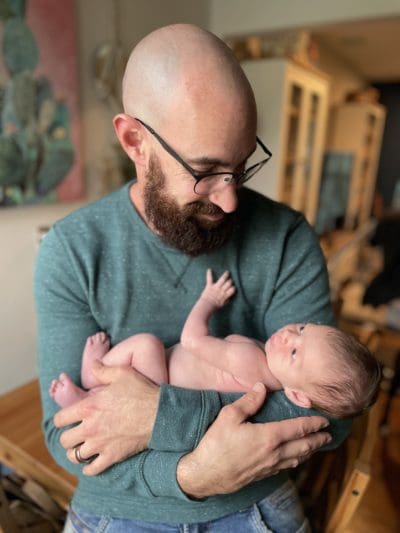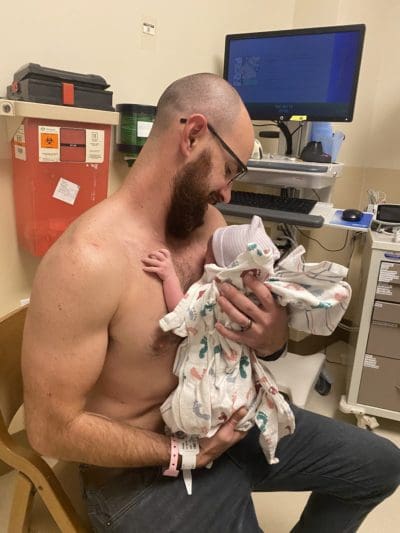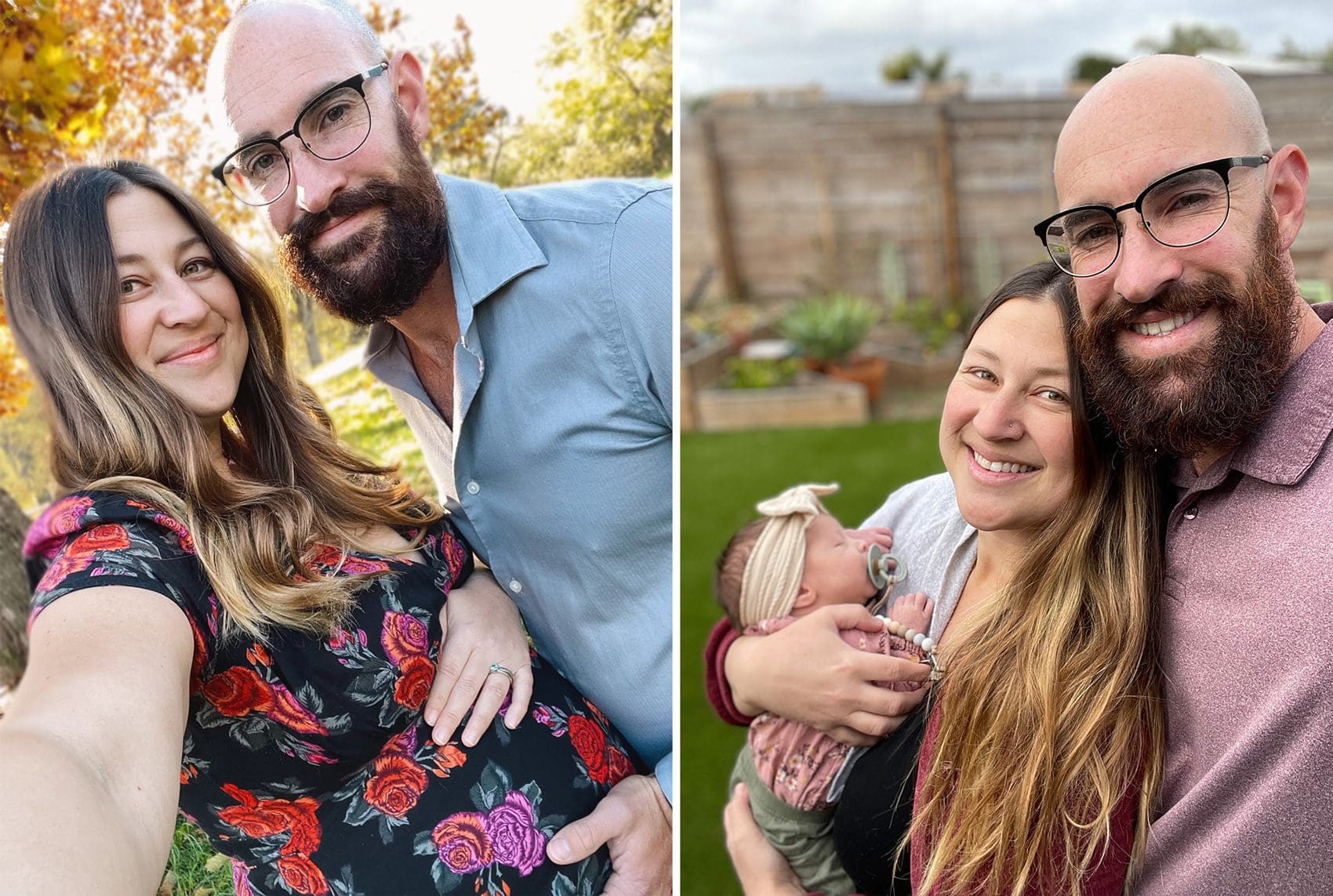By Chelsea Castonguay
Diagnosis:
 Tyler Indermill and his wife, Tasia, were trying to start a family when they ran into an unexpected roadblock. After more than a year of trying to conceive, there was no baby yet or explanation about what was happening. They both underwent testing to see what was going on and learned there were no problems with Tasia’s fertility.
Tyler Indermill and his wife, Tasia, were trying to start a family when they ran into an unexpected roadblock. After more than a year of trying to conceive, there was no baby yet or explanation about what was happening. They both underwent testing to see what was going on and learned there were no problems with Tasia’s fertility.
Their doctor ordered a sperm analysis test (Complete Semen Analysis). The results showed Tyler’s sample contained zero live sperm. That’s when they learned Tyler had azoospermia, a condition in which “there’s no measurable sperm in a man’s ejaculate (semen).” To confirm the diagnosis, Tyler gave a second sample which yielded the same results. At the age of 32, Tyler was infertile. Though the urologist ordered more tests, an answer to the cause of his infertility remained elusive.
After meeting with the urologist, Tyler was moved to a fertility specialist. Answers to the baffling mystery began to emerge. The specialist asked if Tyler had been given a karyotype test, and was surprised the urologist hadn’t ordered one. The results of the karyotype test showed something unexpected: Tyler had an extra X chromosome.
Receiving the results:
When Tyler received the results of the karyotype test, he felt “pure rage.” He said, “I was really upset. I didn’t know how to deal with it. I found myself asking “why me?” It was just a mixed bag of emotions.” He added, “I felt anger, fear, and sadness. It was all lumped into one category of life.”
While he grappled with his feelings, Tasia was steadfast in supporting him. While she was “bummed she wouldn’t be able to have little mini Tylers,” she was there by his side while he processed the diagnosis. She gave him the space he needed. He played the piano every morning, composing his songs, which he described as his “biggest release of emotion and feeling.”
Coming to terms with the diagnosis:
The news of his diagnosis felt like “being hit with a bag of bricks.” Coming to terms with it wasn’t something that happened overnight. The discomfort he felt over learning about having Klinefelter syndrome didn’t just go away, and it took “six months to a year to fully be relieved of the feeling.”
Though it’s been three years since he learned about having 47, XXY, Tyler’s still “constantly learning” about his Klinefelter syndrome diagnosis and “how it all comes into play” in his daily. It feels like “a lifelong learning process,” constantly changing as he adds new variables, such as testosterone replacement therapy.
When asked how he felt about the diagnosis, Tyler reflected, “I’m constantly trying to progress and get past it because I don’t want anything to hold me back. Suppose I can get through things, process, and grieve simultaneously. In that case, it’ll help me get to where I want to be.” Tyler recently shared his story on the Living With XXY podcast, which helped him move towards acceptance. He also got a Klinefelter syndrome-themed tattoo, and he said that made him feel “good to go.”
The journey to Baby Indermill:
Once they confirmed Tyler didn’t have viable semen, the couple began to explore options. They brought their families and friends into the loop, and planned to create a family. Although they discussed fostering and adoption, Tasia wanted the opportunity to experience pregnancy. The urologist advised them not to wait any longer, so they started with a microTESE procedure to see if they could extract any viable sperm for an IUI treatment. While the procedure was expensive and not covered by insurance, it felt essential to Tyler to at least try.
Unfortunately, the procedure failed to locate any live sperm. He felt the grieving process took place before the procedure, and the negative results were the “icing on the cake.” Knowing there was no possibility of any live sperm helped Tyler find closure. Tasia was “bummed she couldn’t carry on the Indermill genetics”, but they were excited for her to have a biological child.
Not wanting to wait any longer to keep trying to start a family, they decided to use donor sperm. They sorted through an online donor base and looked at a “plethora of donors.” They reviewed baby photos, lists of accomplishments, and other information provided by potential donors to make their selections. Tyler wanted a donor with the same blood type he and Tasia shared. That way, they could guarantee their child would have the same blood type.
IUI:
Once the donor had been selected, Tyler and Tasia began the intrauterine insemination (IUI) process. Tyler watched YouTube videos to educate himself on the procedure, and the couple remained hopeful. They attempted the process five times. Each month, the process would be aligned with her fertility cycles for the best chance at conception. However, the process was unsuccessful, resulting in a miscarriage, so they switched gears.
IVF:
Following the unsuccessful IUI procedures, they switched donors before moving on to in vitro fertilization (IVF). They were ready to try a procedure with a higher success rate, and their intuition proved accurate. Tyler helped with the hormone shots, which was made more accessible by the bit of experience he’d gained doing his testosterone replacement therapy shots. The egg retrieval was successful. It was inseminated in a lab with donor sperm. Once fertilized, they transferred it to Tasia five days later. On the first try, they conceived a healthy baby girl.
Living With XXY:
Tyler was transparent with his friends and family, all of whom were supportive. He “didn’t leave anyone in the dark” about what was happening. His outgoing nature and willingness to talk about Klinefelter syndrome extend to friends, family, and folks he meets. He said with a big grin, “Anybody I come across, I always tell them. It just comes out. I want everyone to know now. So I told everyone, parents, family, and friends. Everyone knows.” He found the more he shared, the better it made him feel about the diagnosis. Tyler found “it was empowering” to open up about his extra chromosome.
He laughed about how he finds slipping the diagnosis into shorter conversations harder. Tyler likes to have time to offer education. However, being a soon-to-be dad provided the perfect opportunity to share. When asked if he knew the sex of the baby, he told them since the baby was conceived in a lab, they got to choose the sex. Usually, that would start them on the path to talking about Klinefelter syndrome. He would say, “I don’t have any sperm. I don’t have any testosterone. I give myself shots every two weeks.”
With time, Tyler has processed the news of the diagnosis and his infertility but finds himself at peace with it. He said, “I don’t have any sad bouts of depression or feel bad about the symptoms. “It doesn’t matter to me anymore. I’m just trying to live, progress, and be the best human I can be.”
Being a dad:
 At the time of this writing, baby Indermill hadn’t yet made her appearance, so the question of how he would feel when she arrived was still a mystery. When asked if he felt any trepidation about feeling connected to his daughter, Tyler said he hadn’t really “felt like a father yet,” but felt “like it’ll change when baby girl is here.” Tyler was ecstatic his baby was on her way. He felt certain once she arrived, he would feel that bond.
At the time of this writing, baby Indermill hadn’t yet made her appearance, so the question of how he would feel when she arrived was still a mystery. When asked if he felt any trepidation about feeling connected to his daughter, Tyler said he hadn’t really “felt like a father yet,” but felt “like it’ll change when baby girl is here.” Tyler was ecstatic his baby was on her way. He felt certain once she arrived, he would feel that bond.
What he would want other men to know:
When asked what he’d want other men to learn about their diagnosis and approach their fertility journey, Tyler paused to think. He said, “I think you’d have to go through the process and have the anguish, sadness, and joy, whatever came with it. I didn’t come out on top, not having gone through it. I went through it, and now I’m here to share my story.”
He added, “If you want to be a father, make it happen. The baby’s going to love you regardless. The only thing getting in the way is your psyche, fear-based thoughts, the devil on your left shoulder, and the angel on your right. I don’t see infertility as a terrible thing. Some people have the ability, and some don’t. You have to accept it and be open.”
What they’ll tell their daughter:
The story of her conception won’t be a secret in the Indermill household. Tyler and Tasia plan on telling their baby girl how she came to be as “soon as it’s a healthy time to divulge the news.” Tyler said, “I’ve heard stories of people finding out later in life, and it’s a whole shitstorm. The best thing you can do is to tell them as early as possible so they can understand and give them the time to process. I wouldn’t be the same person if I found out earlier.”
Finally, Tyler reflected, “I would never change who I am. I love who I am. And I love the friends that I have, and I love the relationships that I’ve built. I wouldn’t change myself for anything, even if I could get rid of that extra X because it makes me, me.”
Note: On January 14th, 2023, Tyler and Tasia welcomed their beautiful baby girl Avery Indermill into the family. Everyone is healthy and doing well. The new parents are “so in love” with their sweet girl.




Leave A Comment